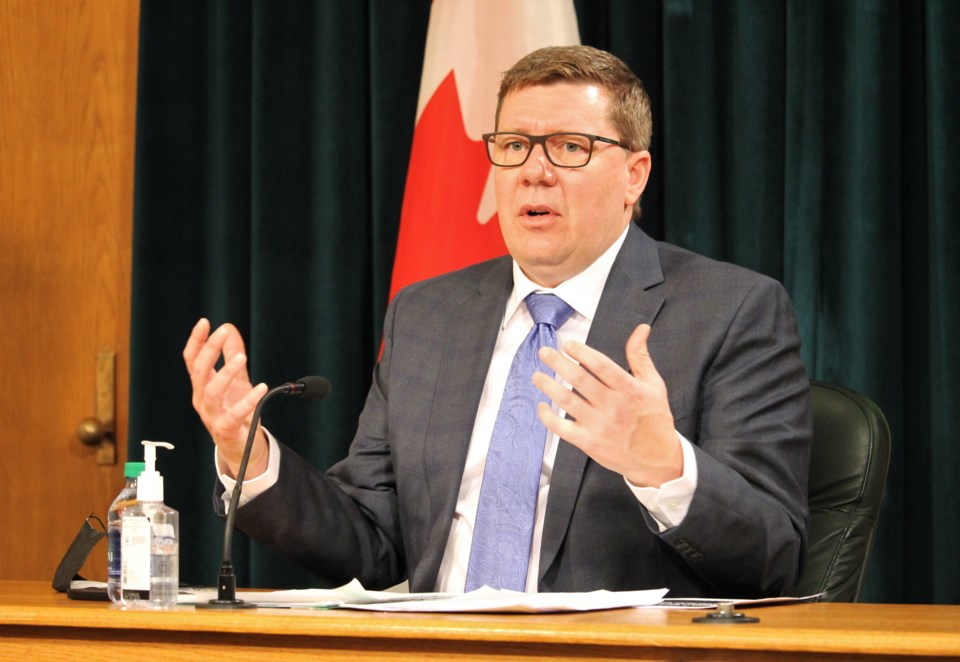REGINA — Saskatchewan is set to be the first province in Canada to lift its proof of vaccination policy, which Premier Scott Moe said will hopefully be the first step in healing “divisions” across the province.
The public health order that requires the provision of proof of vaccination or a negative COVID-19 test result to enter provincial facilities and certain public businesses will expire at midnight on Feb. 13, two weeks earlier than originally intended.
Masking and self-isolation policies included in a separate public health order will remain in place until Feb. 28, at which time Moe said government will not be renewing them further.
Vaccination policies remain in effect for federally regulated sectors, including transportation, as they are under the jurisdiction of the federal government.
“For today, where we are with reducing hospitalizations, reducing numbers, we’re confident as we move ahead with this phased approach, we are going to take these steps back to normal,” said Moe.
The provincial government feels the policy has “run its course” of effectiveness for the public, said Moe, and is ready to be left behind.
“The benefits of this policy no longer outweigh the costs,” said Moe. “It proved to be effective in finding our way through the Delta wave and increased our vaccination rates markedly here in the province, but when you look at the challenges with transmissibility with the Omicron wave, [the policy] has most certainly run its course.”
Moe admitted he was “reluctant” to introduce a vaccine policy to Saskatchewan back in September, as it “would create deep divisions in our families and friendship groups in our province and in communities,” but did so to address the rising fourth wave of cases.
He said the policy created “two classes of citizens” based on vaccination status and the decision to remove it from use was made in the interest of restoring universal access to public amenities.
“It is a divisive policy, it does segregate people in our communities and society,” said Moe. “It's time for us to heal the divisions in our communities.”
The province’s COVID-19 response is now moving to an endemic approach, said officials last week, and will proceed similarly to how other respiratory viruses are treated by public health.
With a set date for the removal of public health orders, this means that from March onwards, the public will be responsible for their own individual risk assessments to decide whether to continue practicing personal safety measures, like wearing masks.
Moe said the success of the province’s “living with COVID” plan will hinge on Saskatchewan residents respecting each other’s personal choices regarding vaccination and mask use.
“We do hold strong opinions in this province and those are on full display often, but we can disagree without being disagreeable,” said Moe.
“We shouldn’t be dwelling or focusing on what other people’s decisions are,” said Moe. “We all need to make an extra effort to understand and respect everyone’s right to make their own decision.”
Businesses wishing to maintain proof of vaccination policies past Feb. 13 will be responsible for any legal ramifications from the practice, added Moe.
“Government is removing any temporary protections we had in place, and that is to create a unified access to schools and to businesses in our communities for all,” said Moe.
When asked if the ongoing freedom convoy rallies occurring across the country, including in Ottawa and briefly in Regina over the weekend, influenced the decision to address proof of vaccination policies, Moe said “not specifically.”
“There is influence from people across the province, I would say not specifically convoys, but we have a large number of MLAs in the Saskatchewan Party [who have been] talking to constituents,” said Moe. “Whether or not they’re in a convoy, they’re still individuals and we want to respect that.”
Moe said that while Saskatchewan is the first province to set out a firm timeline for the lifting of all public health restrictions, he expects to see similar motions from other jurisdictions in the near future.
“I have no doubt that you will see other provinces putting forward what their plan is on living with COVID, and taking steps towards getting life back to normal,” said Moe. “And I would ask the federal government as well, on behalf of Canadians, to be continually revisiting the orders they have in place.”
Further decisions have yet to be finalized regarding how the removal of the proof of vaccination policy will look within the Saskatchewan Health Authority, said Moe, or within long-term care and group homes in the province.





